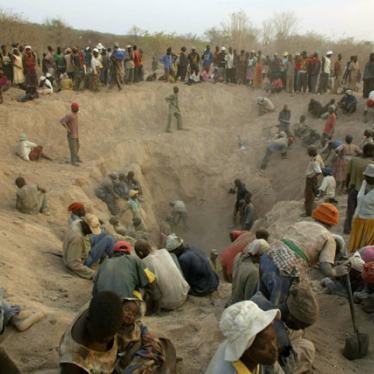Mr. Didier Reynders
Vice-Prime Minister and Minister of Finance
Bruxelles
Dear Minister Reynders,
I am writing in advance of the Kimberley Process Certification Scheme (KPCS) plenary session in Swakopmund, Namibia next week to encourage Belgium to support Zimbabwe's suspension from the KPCS.
Belgium has a critical leadership role in the diamond industry. Our information suggests that it is also a notable destination for raw Marange diamonds. Belgium's position within the KPCS is likely to have great influence on the rest of the European Union. Its reputation could suffer if it continues to handle tainted Zimbabwe stones. Belgium should send an unequivocal message before and during the Swakopmund meeting that it deplores what is happening in Marange, will ensure that Marange diamonds are no longer channeled to Belgium and will support the strongest possible measures against Zimbabwe.
Abuses Connected to Diamond Mining in Zimbabwe
You will know that Human Rights Watch and several other organizations have documented in detail the extensive human rights violations in the Marange diamond fields in eastern Zimbabwe over the past two years. This research has shown how syndicates led by members of Zimbabwe's security forces and civilian officials have directed the illicit extraction and smuggling of Marange diamonds and the accompanying violence that has blighted the area. On June 26, 2009, Human Rights Watch published "Diamonds in the Rough," a detailed report on the situation in Marange.
In June 2009, after much debate, the KPCS sent a review mission to Zimbabwe. On July 4, local and international media reported that the review mission had found Zimbabwe to be in violation of KPCS standards. The review mission, according to media reports, urged the Zimbabwe government to take specific corrective action (i.e., remove military units from Marange, end human rights violations and smuggling, and hold accountable those responsible for abuses) by July 20 or face suspension. The Zimbabwe government has ignored these calls for the last four months.
From October 12 to 23, 2009, our researchers carried out follow-up investigations in Marange to determine the extent to which Zimbabwe has complied with the review mission's recommendations. Our investigation showed that, rather than withdraw from the diamond fields, as the review mission recommended, the Zimbabwean Defence Forces have instead consolidated their presence there. They continue to abuse members of the local community and engage in widespread diamond smuggling. Our experience is also that the military presence in Marange and surrounding areas has actually intensified in a deliberate attempt to restrict independent access and scrutiny.
In our latest investigation, we interviewed 23 people directly linked to the Marange diamond fields and confirmed the following ongoing abuses, all of which put Zimbabwe in violation of the minimum standards required for membership in the Kimberley Process:
- The Zimbabwean army continues to use syndicates of local miners to extract diamonds in Marange, often using forced labor, including of children.
- On September 17, 2009, a soldier shot and killed a 19-year-old man, a member of one syndicate. The soldier stated, in the presence of witnesses, that he had shot the man for hiding a raw diamond instead of handing it over to the soldier.
- Local miners provided corroborated information that soldiers were now recruiting people from outside Marange to join army-run diamond mining syndicates.
- Smuggling of Marange diamonds continues and has intensified. Scores of buyers and middlemen openly trade in Marange diamonds in the Mozambican town of Vila de Manica, across the border, some 20 miles from Mutare. The smugglers include nationals of Lebanon, Belgium, South Africa, and India, who then channel Marange's diamonds into international markets.
The ownership of the Marange diamond fields also remains in dispute. The Zimbabwe government has failed to comply with a High Court order issued by Judge Charles Hungwe on September 28, 2009, which obliged the government to restore prospecting and diamond mining rights in the diamond fields to the previous owner, African Consolidated Resources (Private) Limited (ACR). The judge directed the government-owned company, Zimbabwe Mining Development Corporation (ZMDC), to cease its prospecting and diamond-mining activities in the area belonging to ACR. He also ordered the police to cease interfering with ACR's prospecting and mining activities. Nevertheless, both the police and the army continue to deny ACR access to the diamond fields. Zimbabwe's Minister of Mines may have appealed the High Court Order, but ZMDC has not suspended its prospecting and mining operations in the ACR-owned area pending the appeal.
On October 6, Zimbabwe's president, Robert Mugabe, announced that the power-sharing government had selected two new private-sector investors to take over mining in Marange. However, the selection process has been shrouded in secrecy and, to date, the identities of the two investors remain unknown. The KPCS rules require participants to ensure that all diamond mines are properly licensed and to allow only mines so licensed to extract diamonds.
Our June report documented how the Zimbabwean army, which remains under the control of Zimbabwe African National Union-Patriotic Front (ZANU-PF), the former ruling party, has committed horrific abuses against miners and local residents, including killings, beatings, and torture. The report revealed the army's policy of rotating military units into the diamond fields for roughly two-month periods. We also showed how this policy was designed to maintain the loyalty of senior military and other officials to ZANU-PF by giving them illicit access to Zimbabwe's mineral wealth at a time of national economic and political crisis. The rotation of army units into Marange continues. At the beginning of October 2009, the Harare-based special mechanized brigade was deployed there, replacing the Kwekwe-based fifth brigade.
The Role of the Kimberley Process
We understand that several options on Zimbabwe have been debated by KPCS members in the run-up to next month's meeting in Swakopmund. Full suspension is one. Other actions fall short of suspension, such as asking Zimbabwe to temporarily suspend itself from the KPCS or some kind of technical assistance program to bring Zimbabwe back into compliance. In our view, Zimbabwe has already reneged on a public commitment to withdraw the army from Marange. It is only with the full force of suspension that it will be moved to take corrective action. It is clear that Zimbabwe intends to continue stone-walling the KPCS-as it has been doing for the past two years-in the belief that countries like Belgium will not act.
We are encouraging all KPCS participants at Swakopmund to prevent Zimbabwe from exporting any diamonds and from participation in the KPCS until it fully complies with the following minimum recommendations:
- Immediately end all human rights violations in the Marange diamond fields, including killings, beatings, forced labor, child labor, and torture.
- Remove the army from Marange district, and demilitarize and depoliticize Zimbabwe's diamond industry.
- Restore security responsibilities in Marange to the police, but ensure that they abide by accepted international law enforcement standards and respect the rule of law.
- Launch an impartial and independent investigation into alleged human rights abuses linked to the illicit extraction of Marange diamonds, their smuggling, and the associated culture of official corruption.
- Hold accountable all civilians, soldiers, and police implicated in these abuses, irrespective of seniority.
- Urgently resolve the outstanding legal questions of control and title to the Marange diamond fields in compliance with the relevant High Court Order. Lack of clarity around control and title has fostered an environment conducive to violence, corruption, and smuggling.
- Ensure that, in the event that relocation of the local community around the diamond fields is found to be necessary, such relocation fully complies with national and international human rights standards, and is carried out transparently in full consultation with the affected communities.
Zimbabwe's suspension and a ban on Marange diamonds are now critical to the credibility of the Kimberley Process and the diamond industry. Zimbabwe's diamonds are being mined in contravention of KPCS rules and in an environment of coercion, violence, and systematic corruption. The KPCS was established to end the trade in "conflict diamonds" and must fulfill its commitment to consumers that the stones they purchase have not been mined in situations of grave human rights abuse.
Once Zimbabwe has been suspended, we are also asking Kimberley Process participants to set up a local monitoring mechanism comprising independent local civil society organizations and Marange community leaders. This mechanism could work with the KPCS in monitoring and verifying any remedial steps by the Zimbabwe government that may ultimately lead to its re-admission to the Kimberley Process.
Human Rights Watch will be present at the Swakopmund meeting and would be delighted to brief you further on our latest research.
Yours sincerely,
Georgette Gagnon
Executive Director
Africa Division






